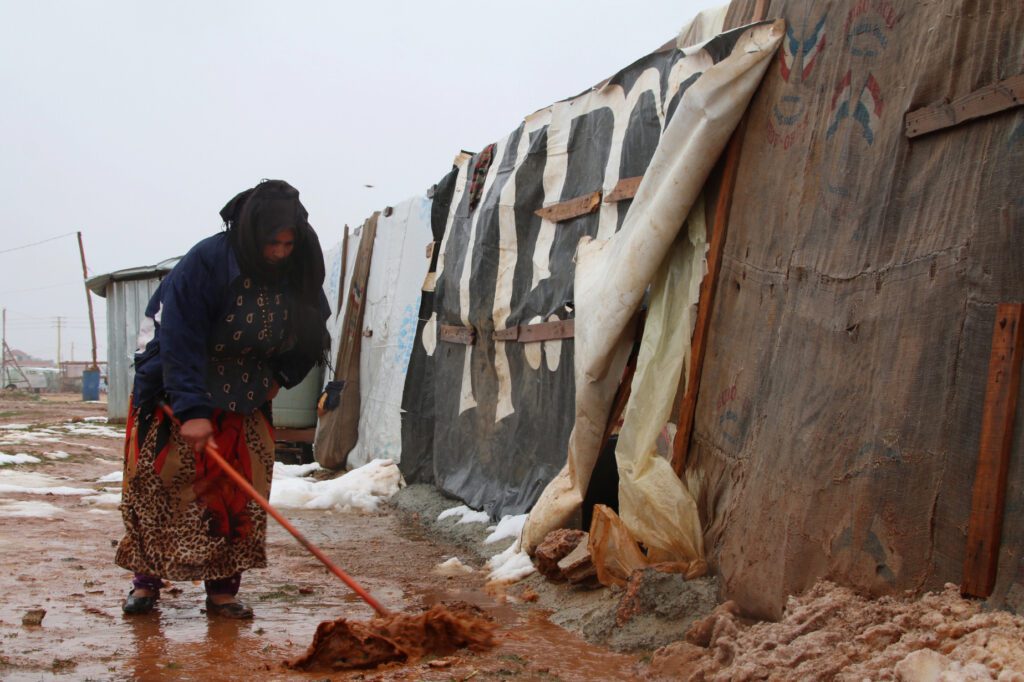In Arsal and other regions of Bekaa, the deterioration of services and vital facilities has led to a dramatic drop in quality of life and access to basic needs. In informal settlements where refugees reside, matters are exponentially worse.
More recently, funding cuts by donor organizations and the decline in public services have particularly impacted the Water, Hygiene and Sanitation (WASH) sector. As a result, water-borne diseases and a range of health complications have started appearing, and are expected to continue if funding requirements are not met.
While WASH services require around 35 million dollars, only four million dollars are available, according to the WASH Working Group for the Syria Refugee Response in Lebanon.
In Arsal, informal settlements have witnessed a rise in new skin conditions impacting dozens of individuals, in addition to the spread of cases of cholera.
During the winter season, the frailty of infrastructure in informal settlements was laid bare as floods proliferated. More recently, fires have also been a recurrent occurrence in informal settlements, with the Hamad al-Hassan refugee camp burning to the ground last April, leaving 500 refugees homeless amidst suspicions of intentionality.
On one hand, across informal settlements, floods are facilitated by the muddy nature of the ground on which encampments are established. On the other hand, electricity cables are widely spread through and across tents, increasing risks of electric accidents.
Amid such conditions, risks of disasters rise dramatically, while access to services such as healthcare and education remain in a dismal state, with nine out of 10 Syrian refugees in Lebanon unable to access basic needs.
A Vicious Cycle of Poverty and Displacement
Since the onset of the Lebanese crisis in 2019 and especially during the last year, campaigns of violence against Syrian refugees have skyrocketed. Groups of thugs have been documented (or have documented themselves) assaulting refugees across different neighborhoods. Mass expulsions from areas and tent burnings have also been a recurrent mode of violence.
Governmental and local authority measures have also surged, with municipalities taking more restrictive measures such as imposing curfews and requiring unrealistic tasks from displaced Syrians.
After the killing of Lebanese Forces regional coordinator Pascal Sleiman last month, violence across all of these sectors and beyond has exponentially increased, with the month of April being riddled with initiatives on the displacement file, including a one billion euro financial package from the European Union.
Ideally, one would expect the financial package to have an emphasis on refugees’ access to basic needs and services and improved livelihood opportunities. However, the reality is much more grim.
While the agreement between the EU and Lebanon did include some elements related to improving education and other social services, it was mainly focused on border management and the crackdown on irregular migration.
In 2024, the United Nations High Commissioner for Refugees (UNHCR), the WASH sector, and the overall humanitarian sector in Lebanon saw an unprecedented drop in funding and services.
Coupled with the dramatic increase in violence, the precariousness of displaced Syrians and other vulnerable groups in Lebanon expected to deteriorate further, impacting host communities and social cohesion prospects as well and having wide reaching implications for the country’s socioeconomic prospects.
Now more than ever, sustainable and inclusive solutions are critically required lest the country sinks further into total chaos and deprivation.
